人教版(2019)必修第三册Unit5 The Value of Money单元知识点课件(59张ppt)
文档属性
| 名称 | 人教版(2019)必修第三册Unit5 The Value of Money单元知识点课件(59张ppt) | 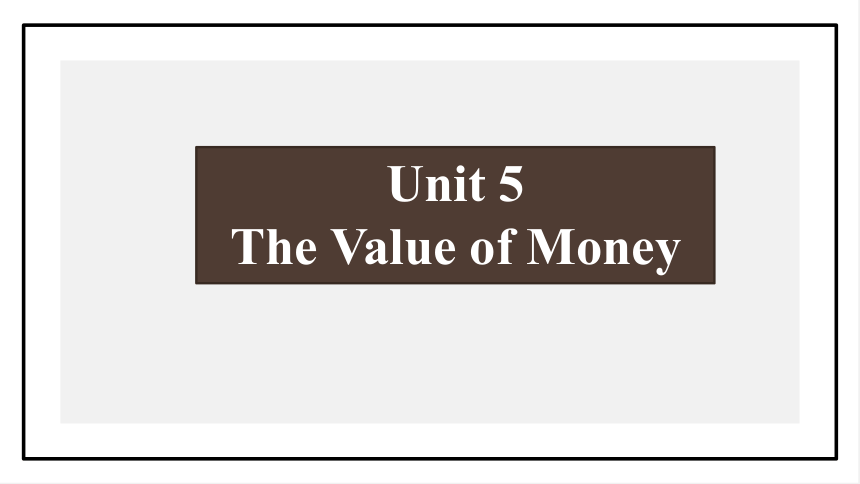 | |
| 格式 | zip | ||
| 文件大小 | 3.4MB | ||
| 资源类型 | 教案 | ||
| 版本资源 | 人教版(2019) | ||
| 科目 | 英语 | ||
| 更新时间 | 2022-05-18 21:37:08 | ||
图片预览

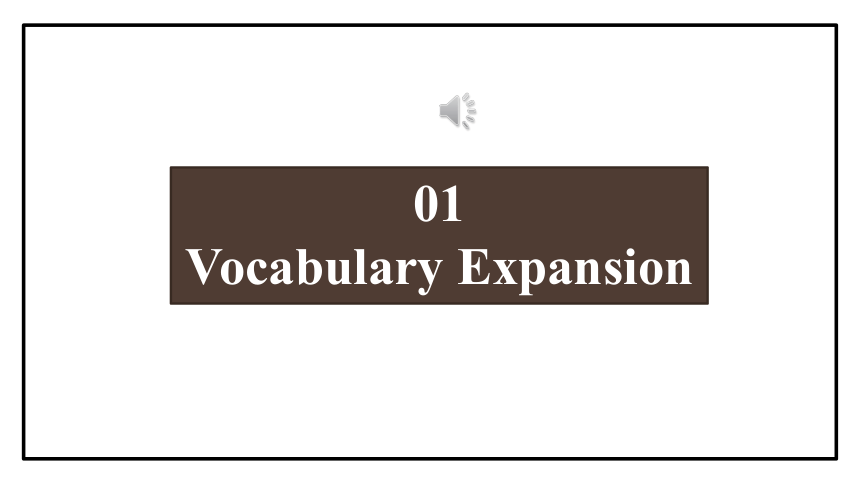

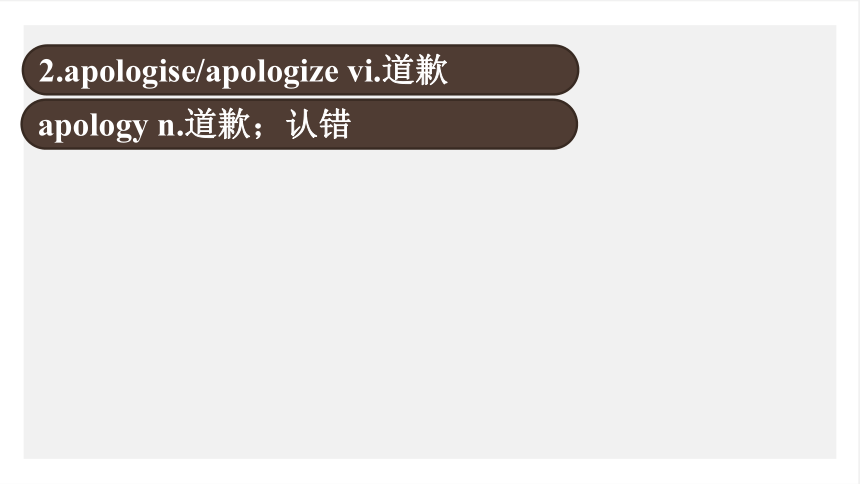
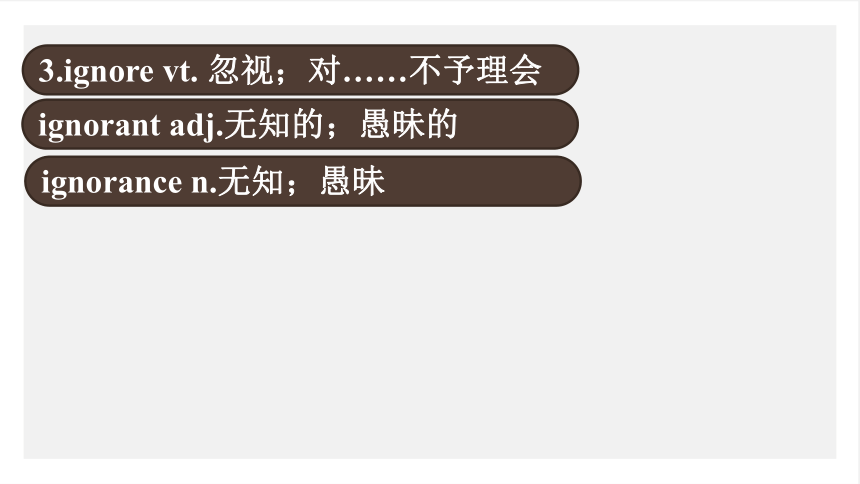
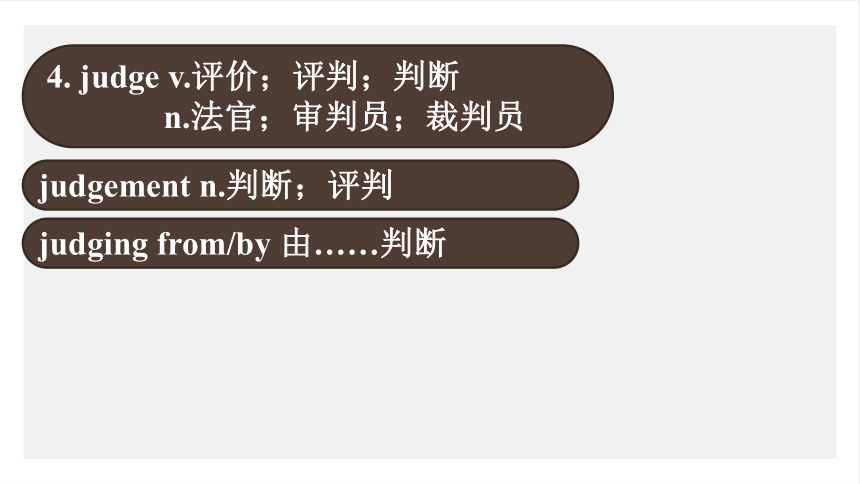
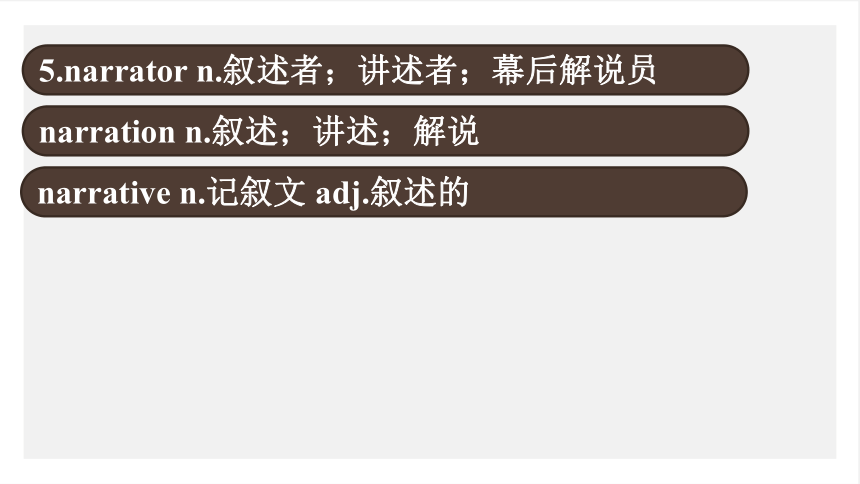
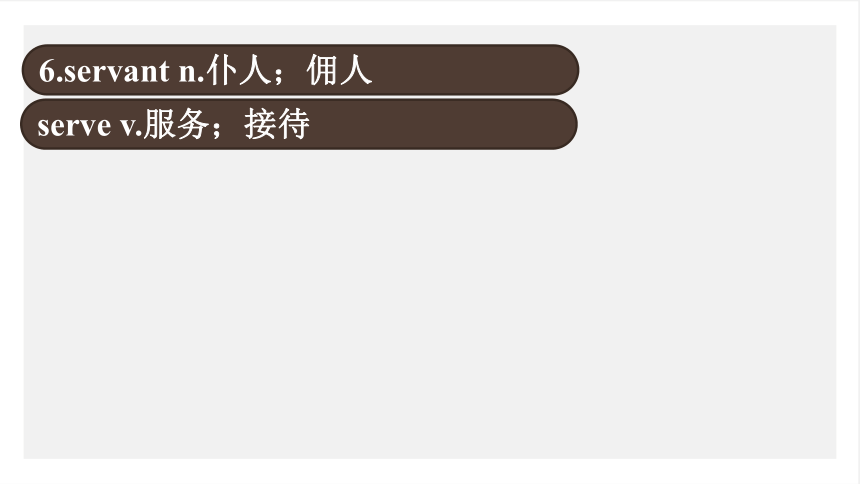

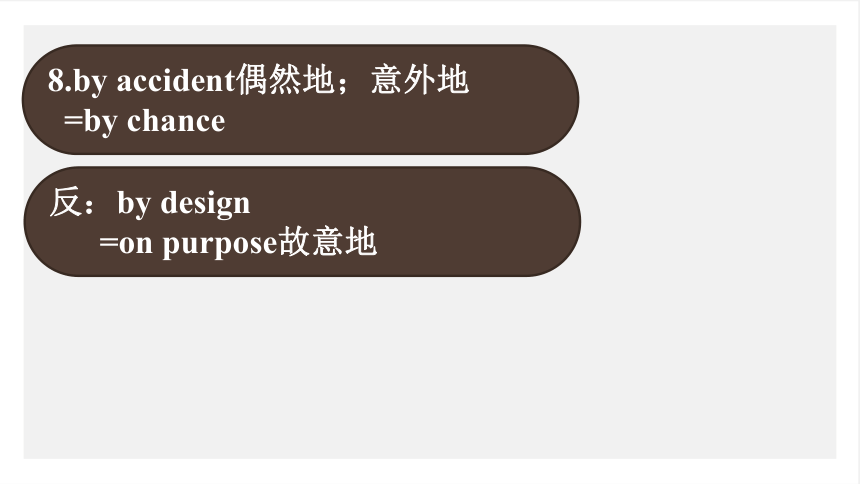

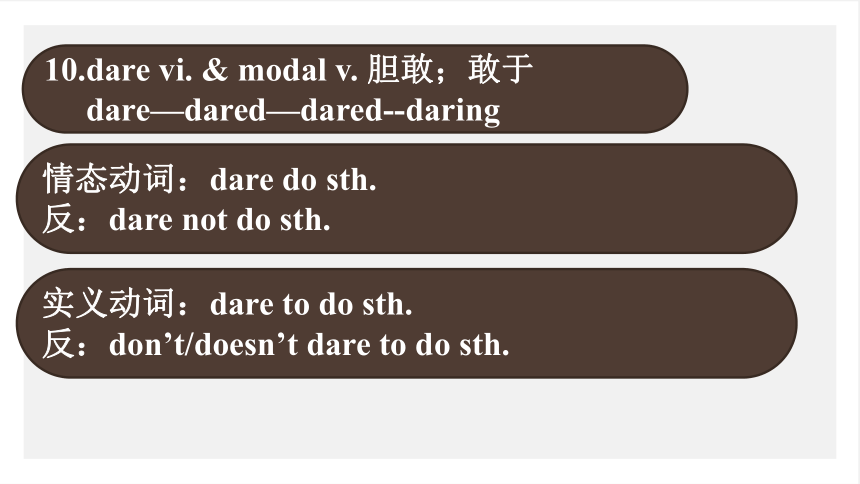
文档简介
(共59张PPT)
Unit 5
The Value of Money
01
Vocabulary Expansion
1.basis n.基础;根据;基点
base n.基础;基地 v.以……为基础
basic adj.根本的;基本的
on the basis of在某事的基础上;根据某事
be based on/upon以……为基础
2.apologise/apologize vi.道歉
apology n.道歉;认错
3.ignore vt. 忽视;对……不予理会
ignorant adj.无知的;愚昧的
ignorance n.无知;愚昧
4. judge v.评价;评判;判断
n.法官;审判员;裁判员
judgement n.判断;评判
judging from/by 由……判断
5.narrator n.叙述者;讲述者;幕后解说员
narration n.叙述;讲述;解说
narrative n.记叙文 adj.叙述的
6.servant n.仆人;佣人
serve v.服务;接待
7.as a matter of fact 事实上;其实;说真的
=in fact
=in reality
=actually
8.by accident偶然地;意外地
=by chance
反:by design
=on purpose故意地
9.spot vt. 看见;注意到;发现
n. 地点;处所;斑点;污迹
spot—spotted—spotted—spotting
10.dare vi. & modal v. 胆敢;敢于
dare—dared—dared--daring
情态动词:dare do sth.
反:dare not do sth.
实义动词:dare to do sth.
反:don’t/doesn’t dare to do sth.
11.mining n.采矿;采矿业
mine pron.我的 n.矿
miner n.矿工
12.patience n.耐心;忍耐力;毅力
反:impatience
patient adj.有耐心的 n.病人
反:impatient
patiently adv.耐心地
13.to be honest 说实话;坦率地说
honest adj.诚实的
honestly adv.真诚地
honesty n.诚实
14.be about to do sth.正要做某事。
sb. be about to do sth. when…
某人正要做某事,这时…
sb. be on the point of doing sth. when…
某人正要做某事,这时…
sb. be doing sth. when…
某人正在做某事,这时…
sb. had just done sth. when…
某人刚刚做完某事,这时…
15.indicate v.表明;显示;象征;暗示
indication n.迹象;标示
16.odd adj.奇怪的;怪异的;反常的
oddly adv.奇怪地
17.intention n.打算;计划;意图;目的
intend v.打算;计划
intended adj. 故意的;为……打算
be intended for为……而打算/设计
18.musical n.音乐剧 adj.音乐的
music n.音乐
musician n.音乐家
19.hug v.拥抱
hug—hugged—hugged—hugging
20.pursue vt. 追求;致力于
pursuit n. 追求
in the pursuit of追求
21.hesitate vi. 犹豫;迟疑;顾虑
hesitation n. 犹豫;迟疑;顾虑
22.eventually adv. 最后;终于
eventual adj. 最后的;最终的
23.downstairs adv. 往楼下
n. 楼下
adj.楼下的
upstairs adv. 往楼上
n. 楼上
adj. 楼上的
24.option n.可选择的事物;选择;选择权
optional adj.可选择的
25.broad adj. 宽阔的;广阔的; 广泛的
broaden v.使扩大;使变宽
long—length—lengthen
wide—width—widen
high—height—heighten
deep—depth—deepen
broad—breadth—broaden
strong—strength—strengthen
broad adj.宽阔的
abroad adv. 在国外;去国外
board v.上船/飞机/火车 n.木板;董事会
aboard adv.在/上船/飞机/火车
go aboard=board 上船/火车/飞机
26.normal adj.典型的;正常的;一般的;精神正常的
n.常态;通常标准;一般水平
normally adv.正常地;通常
abnormal adj.不正常的;反常的
abnormally adv.反常地
27.willing adj.愿意;乐意
be willing to do sth. 愿意/乐意做某事
unwilling adj.不乐意的
willingness n.乐意;愿意
28.external adj.外部的;外面的;外来的
internal adj.内部的;内在的
英汉互译
1. 以……为基础___________
2. 由……判断______________
3. 事实上_____________
4. 偶然地;意外地______________
5. 乐意做某事________________
6. 追求______________
7. 专为……设计/打算________________
8.某人正在做某事这时……________________
be based on/upon
judging from/by
as a matter of fact/in fact/in reality/actually
by accident/chance
be willing to do sth.
in the pursuit of
be intended for
sb. be doing sth. when…
02
Reading and Thinking
1.n.&v.打赌
2.看到某人正在做某事
3.走进
4.进来
5.进入房间
6.来做某事/去做某事
7.事实上
8.着陆在……
9.偶然地;意外地/故意地
10.v.航行
11.发现某人被……
12.被发现……
13.强调句
14.美国领事馆
15.寻求帮助
16.无论如何;不管怎样=anyhow
17.不敢做某事
18.担心=be worried about
19.n.优势;优点
1.v.听懂;理解
2.采矿公司
3.向某人提供某物
4.n.耐心
5.v.介意
6.说实话
7.运气太好了
8.应该做某事
9.关心;担心
10.正要做某事
11.去取/去拿
12.adv.小心地;仔细地
13.最好不要做某事
14.直到……才……
15.n.慈善;施舍
16.adj.勤奋的
17.那就是为什么……
18.送某人出去
19.为什么不做某事?
20.adv.正是;恰好;精确地
21.直到…….
1.What’s the main idea of the text
Money is everything.
Lucky Henry.
A bet between two wealthy men.
A million-pound bank note.
2.Why do the two brothers give Henry Adams an envelope
They want to play a trick on Henry.
They have a pity on Henry.
They made a bet.
Henry isn’t an Englishman.
3.Henry comes to Britain for the first time in his life_______.
to find a better life.
to make an adventure
all by accident
to find the two brothers
4.How does Henry Adams feel when he gets an envelope from the brothers
A. Sad B. Happy C. Astonished D. Excited
5.Why is Oliver so happy when hearing Henry say he had no money
They can do something good for him.
They are interested to find so poor a man.
They can show off their bank note to him.
They finally find the right person for their bet.
填空。
The two gentlemen had been having a heated argument for a couple of days, and had decided to make a _______ which would settle their argument. They were going to find someone to take part in their bet when they saw Henry walking on the street outside. They invited him into their house, where Henry told them he had landed in Britain by _______ . Although he had gone to the American consulate to ______ help, he had not received any. Henry hoped that the brothers would offer him some ______ of work because he had no money. Henry got upset with the brothers when
accident
bet
seek
sort
they seemed too happy about his bad luck. They quickly told him not to feel that way and they gave him an envelope with money in it. They said the letter inside would explain what it was all about, but he had to postpone opening it until 2 o’clock. Henry felt that was odd. The _______ ended with Henry leaving their house and promising that he would not open the letter until 2 o’clock.
scene
1.bet
2.spot
3.hug
4.permit
5.make
6.see
7.step
8.come
9.carry
10.seek
11.worry
12.sit
不规则动词
bet
spotted
hugged
permitted
made
saw
stepped
came
carried
sought
worried
sat
bet
spotted
hugged
permitted
made
seen
stepped
come
carried
sought
worried
sat
I find the book interesting.
I find the lights on.
I find myself in the hospital.
I find Tom crying.
I find Tom play computer games.
I find myself carried out to sea by a strong wind.
I find it easy to learn English.
Grammar 1: find+宾语+宾补
find+宾语+adj.
find+宾语+adv.
find+宾语+介词短语
find+宾语+doing
find+宾语+do
find+宾语+done
find + it +宾语+to do (6123)
I found myself carried out to sea by a strong wind.
find + 宾语 + 宾补:
adj./adv./介词短语
doing(主动进行)
find + 宾语 + do(全过程)
done(被动完成)
find + it + adj./n. + to do/doing/that…(6123结构)
1.When he came to himself, he found himself _________(lock) in the room.
2.A group of children were found _________(play) on the playground.
3.Some students find it not easy ______________(understand) English grammar.
4.Mary hurried there, only __________(find) them all out.
locked
playing
to understand
to find
And it was the ship that brought you to England.
Grammar 2:强调句
强调句型:It is/was+被强调部分+that/who+其他。
一般疑问句:Is/Was it+被强调部分+that/who+其他?
特殊疑问句:特殊疑问词+is/was it+that/who+其他?
直到……才…… It is/was not until…that……
注意:
1.不能强调谓语;强调谓语时用:do/does/did+动词原形
2.判断是否为强调句:去掉it is/was和that/who看句子是否完整,完整则为强调句。
1.It is with your help _______I can finish my college.
2.It was not until yesterday ________ I knew the truth.
3.It ______ Mary that I met on the street yesterday.
4._______ was a famous star that/who we met in the park.
that
that
was
It
03
Reading for Writing
1.adj.磨损的;用旧的
2.n.指示牌;迹象;记号;手势
3.裁缝铺
4.以一种粗鲁的方式
5.adj.现成的;做好的
6.adv.&n.&adj.在楼下;往楼下
7.n.楼梯
8.adv.在旁边
9.v.耳语;低声说话
10.v.&n.皱眉
11.v.认为;猜想
12.宁愿不做某事
13.根据……判断……
14.给某人造成麻烦
15.一点也不
1.既然那样
2.v.折叠/打开
3.脱掉;起飞;成功
4.各种各样的;一系列的
5.从……中选择
6.adj.宽阔的
7.n.场合;时机
8.adv.其实;事实上;确实
9.得到报酬
10.adj.典型的;正常的;一般的
动词原形
1.wear
2.get
3.drop
4.see
5.choose
6.make
7.pay
不规则动词
动词过去式
wore
got
dropped
saw
chose
made
paid
动词过去分词
worn
gotten/got
dropped
seen
chosen
made
paid
04
Discovering Useful Structures
情态动词:表示说话人的情绪/态度/或语气;不能单独作谓语;只能和其他动词原形(should do/be done)一起构成谓语。
表示推测 can(能);may(可能);might(可能);must(一定);should(应该);ought to(应该);will/would(会)
表示义务/责任/必要性 must(必须);have to(不得不);should(应该);ought to(应该);need(有必要);needn’t(没有必要);don’t have to(不必);had better(最好)
表示能力 can(能够);could(能够);be able to(能够)
表示请求/许可/禁止 Can/May/Could/Might/Shall I… Will you… Would you please… can’t (不许);may not(不可以);mustn’t(禁止)
表示习惯/倾向 used to do(过去常常);would do(过去的习惯行为);will do(常常)
表示意愿 will(愿意);shall(表命令/允诺/强烈的意愿);dare(敢)
注意事项:
1.情态动词大部分都没有过去式和过去分词;除了:can-could/will-would/have to-had to/may-might;
You could go with him.
情态动词
2.shall在疑问句中,只用于第一人称;
Shall I ask you a question
3.should用在表示惊奇/怀疑/不满等的名词性从句中,表示“竟然;竟会”;
It is strange that he should not pass so easy an exam.
注意事项:
1.情态动词大部分都没有过去式和过去分词;除了:can-could/will-would/have to-had to/may-might;
You could go with him.
2.shall在疑问句中,只用于第一人称;
Shall I ask you a question
3.should用在表示惊奇/怀疑/不满等的名词性从句中,表示“竟然;竟会”;
It is strange that he should not pass so easy an exam.
情态动词+have done
must have done 一定做了 He must have passed the exam.
may/might/can have done 可能做了He may/might/can have passed the exam.
could/might have done 本可以做He could/might have passed the exam.
needn’t have done 本不必做He needn’t have cleaned the room.
ought to/should have done 本应该做He ought to/should have cleaned the room.
oughtn’t to/shouldn’t have done 本不应该做He oughtn’t to/shouldn’t have said that.
定义:表示在过去某一时间将要发生的动作或存在的状态。
过去将来时
形式:主句:一般过去时 从句:过去将来时
结构:would do; was/were going to do; was/were about to do; was/were to do
时间状语:the next day(第二天);soon(很快;不久)
过去将来时
e.g. They said the letter inside would explain what it was all about.
They were going to find someone to take part in the meeting.
Mr Li was about to sit down when the phone rang.
The meeting was to be held next week.
1.When he was young, he ______ climb the small hill every morning.
2.If you ______ pass the driving test, you ______ get a new car.
3.Our teacher _________ come to the party with us, but we are not sure.
4. Hurry up! We ________________go to school right away.
5. You ________ smoke in this part of the hospital.
6.You ________ buy a gift, but you can if you want to.
would
can
will
may
ought to/should
musn’t
needn’t
延时符
THANK YOU
感谢一路有你
Unit 5
The Value of Money
01
Vocabulary Expansion
1.basis n.基础;根据;基点
base n.基础;基地 v.以……为基础
basic adj.根本的;基本的
on the basis of在某事的基础上;根据某事
be based on/upon以……为基础
2.apologise/apologize vi.道歉
apology n.道歉;认错
3.ignore vt. 忽视;对……不予理会
ignorant adj.无知的;愚昧的
ignorance n.无知;愚昧
4. judge v.评价;评判;判断
n.法官;审判员;裁判员
judgement n.判断;评判
judging from/by 由……判断
5.narrator n.叙述者;讲述者;幕后解说员
narration n.叙述;讲述;解说
narrative n.记叙文 adj.叙述的
6.servant n.仆人;佣人
serve v.服务;接待
7.as a matter of fact 事实上;其实;说真的
=in fact
=in reality
=actually
8.by accident偶然地;意外地
=by chance
反:by design
=on purpose故意地
9.spot vt. 看见;注意到;发现
n. 地点;处所;斑点;污迹
spot—spotted—spotted—spotting
10.dare vi. & modal v. 胆敢;敢于
dare—dared—dared--daring
情态动词:dare do sth.
反:dare not do sth.
实义动词:dare to do sth.
反:don’t/doesn’t dare to do sth.
11.mining n.采矿;采矿业
mine pron.我的 n.矿
miner n.矿工
12.patience n.耐心;忍耐力;毅力
反:impatience
patient adj.有耐心的 n.病人
反:impatient
patiently adv.耐心地
13.to be honest 说实话;坦率地说
honest adj.诚实的
honestly adv.真诚地
honesty n.诚实
14.be about to do sth.正要做某事。
sb. be about to do sth. when…
某人正要做某事,这时…
sb. be on the point of doing sth. when…
某人正要做某事,这时…
sb. be doing sth. when…
某人正在做某事,这时…
sb. had just done sth. when…
某人刚刚做完某事,这时…
15.indicate v.表明;显示;象征;暗示
indication n.迹象;标示
16.odd adj.奇怪的;怪异的;反常的
oddly adv.奇怪地
17.intention n.打算;计划;意图;目的
intend v.打算;计划
intended adj. 故意的;为……打算
be intended for为……而打算/设计
18.musical n.音乐剧 adj.音乐的
music n.音乐
musician n.音乐家
19.hug v.拥抱
hug—hugged—hugged—hugging
20.pursue vt. 追求;致力于
pursuit n. 追求
in the pursuit of追求
21.hesitate vi. 犹豫;迟疑;顾虑
hesitation n. 犹豫;迟疑;顾虑
22.eventually adv. 最后;终于
eventual adj. 最后的;最终的
23.downstairs adv. 往楼下
n. 楼下
adj.楼下的
upstairs adv. 往楼上
n. 楼上
adj. 楼上的
24.option n.可选择的事物;选择;选择权
optional adj.可选择的
25.broad adj. 宽阔的;广阔的; 广泛的
broaden v.使扩大;使变宽
long—length—lengthen
wide—width—widen
high—height—heighten
deep—depth—deepen
broad—breadth—broaden
strong—strength—strengthen
broad adj.宽阔的
abroad adv. 在国外;去国外
board v.上船/飞机/火车 n.木板;董事会
aboard adv.在/上船/飞机/火车
go aboard=board 上船/火车/飞机
26.normal adj.典型的;正常的;一般的;精神正常的
n.常态;通常标准;一般水平
normally adv.正常地;通常
abnormal adj.不正常的;反常的
abnormally adv.反常地
27.willing adj.愿意;乐意
be willing to do sth. 愿意/乐意做某事
unwilling adj.不乐意的
willingness n.乐意;愿意
28.external adj.外部的;外面的;外来的
internal adj.内部的;内在的
英汉互译
1. 以……为基础___________
2. 由……判断______________
3. 事实上_____________
4. 偶然地;意外地______________
5. 乐意做某事________________
6. 追求______________
7. 专为……设计/打算________________
8.某人正在做某事这时……________________
be based on/upon
judging from/by
as a matter of fact/in fact/in reality/actually
by accident/chance
be willing to do sth.
in the pursuit of
be intended for
sb. be doing sth. when…
02
Reading and Thinking
1.n.&v.打赌
2.看到某人正在做某事
3.走进
4.进来
5.进入房间
6.来做某事/去做某事
7.事实上
8.着陆在……
9.偶然地;意外地/故意地
10.v.航行
11.发现某人被……
12.被发现……
13.强调句
14.美国领事馆
15.寻求帮助
16.无论如何;不管怎样=anyhow
17.不敢做某事
18.担心=be worried about
19.n.优势;优点
1.v.听懂;理解
2.采矿公司
3.向某人提供某物
4.n.耐心
5.v.介意
6.说实话
7.运气太好了
8.应该做某事
9.关心;担心
10.正要做某事
11.去取/去拿
12.adv.小心地;仔细地
13.最好不要做某事
14.直到……才……
15.n.慈善;施舍
16.adj.勤奋的
17.那就是为什么……
18.送某人出去
19.为什么不做某事?
20.adv.正是;恰好;精确地
21.直到…….
1.What’s the main idea of the text
Money is everything.
Lucky Henry.
A bet between two wealthy men.
A million-pound bank note.
2.Why do the two brothers give Henry Adams an envelope
They want to play a trick on Henry.
They have a pity on Henry.
They made a bet.
Henry isn’t an Englishman.
3.Henry comes to Britain for the first time in his life_______.
to find a better life.
to make an adventure
all by accident
to find the two brothers
4.How does Henry Adams feel when he gets an envelope from the brothers
A. Sad B. Happy C. Astonished D. Excited
5.Why is Oliver so happy when hearing Henry say he had no money
They can do something good for him.
They are interested to find so poor a man.
They can show off their bank note to him.
They finally find the right person for their bet.
填空。
The two gentlemen had been having a heated argument for a couple of days, and had decided to make a _______ which would settle their argument. They were going to find someone to take part in their bet when they saw Henry walking on the street outside. They invited him into their house, where Henry told them he had landed in Britain by _______ . Although he had gone to the American consulate to ______ help, he had not received any. Henry hoped that the brothers would offer him some ______ of work because he had no money. Henry got upset with the brothers when
accident
bet
seek
sort
they seemed too happy about his bad luck. They quickly told him not to feel that way and they gave him an envelope with money in it. They said the letter inside would explain what it was all about, but he had to postpone opening it until 2 o’clock. Henry felt that was odd. The _______ ended with Henry leaving their house and promising that he would not open the letter until 2 o’clock.
scene
1.bet
2.spot
3.hug
4.permit
5.make
6.see
7.step
8.come
9.carry
10.seek
11.worry
12.sit
不规则动词
bet
spotted
hugged
permitted
made
saw
stepped
came
carried
sought
worried
sat
bet
spotted
hugged
permitted
made
seen
stepped
come
carried
sought
worried
sat
I find the book interesting.
I find the lights on.
I find myself in the hospital.
I find Tom crying.
I find Tom play computer games.
I find myself carried out to sea by a strong wind.
I find it easy to learn English.
Grammar 1: find+宾语+宾补
find+宾语+adj.
find+宾语+adv.
find+宾语+介词短语
find+宾语+doing
find+宾语+do
find+宾语+done
find + it +宾语+to do (6123)
I found myself carried out to sea by a strong wind.
find + 宾语 + 宾补:
adj./adv./介词短语
doing(主动进行)
find + 宾语 + do(全过程)
done(被动完成)
find + it + adj./n. + to do/doing/that…(6123结构)
1.When he came to himself, he found himself _________(lock) in the room.
2.A group of children were found _________(play) on the playground.
3.Some students find it not easy ______________(understand) English grammar.
4.Mary hurried there, only __________(find) them all out.
locked
playing
to understand
to find
And it was the ship that brought you to England.
Grammar 2:强调句
强调句型:It is/was+被强调部分+that/who+其他。
一般疑问句:Is/Was it+被强调部分+that/who+其他?
特殊疑问句:特殊疑问词+is/was it+that/who+其他?
直到……才…… It is/was not until…that……
注意:
1.不能强调谓语;强调谓语时用:do/does/did+动词原形
2.判断是否为强调句:去掉it is/was和that/who看句子是否完整,完整则为强调句。
1.It is with your help _______I can finish my college.
2.It was not until yesterday ________ I knew the truth.
3.It ______ Mary that I met on the street yesterday.
4._______ was a famous star that/who we met in the park.
that
that
was
It
03
Reading for Writing
1.adj.磨损的;用旧的
2.n.指示牌;迹象;记号;手势
3.裁缝铺
4.以一种粗鲁的方式
5.adj.现成的;做好的
6.adv.&n.&adj.在楼下;往楼下
7.n.楼梯
8.adv.在旁边
9.v.耳语;低声说话
10.v.&n.皱眉
11.v.认为;猜想
12.宁愿不做某事
13.根据……判断……
14.给某人造成麻烦
15.一点也不
1.既然那样
2.v.折叠/打开
3.脱掉;起飞;成功
4.各种各样的;一系列的
5.从……中选择
6.adj.宽阔的
7.n.场合;时机
8.adv.其实;事实上;确实
9.得到报酬
10.adj.典型的;正常的;一般的
动词原形
1.wear
2.get
3.drop
4.see
5.choose
6.make
7.pay
不规则动词
动词过去式
wore
got
dropped
saw
chose
made
paid
动词过去分词
worn
gotten/got
dropped
seen
chosen
made
paid
04
Discovering Useful Structures
情态动词:表示说话人的情绪/态度/或语气;不能单独作谓语;只能和其他动词原形(should do/be done)一起构成谓语。
表示推测 can(能);may(可能);might(可能);must(一定);should(应该);ought to(应该);will/would(会)
表示义务/责任/必要性 must(必须);have to(不得不);should(应该);ought to(应该);need(有必要);needn’t(没有必要);don’t have to(不必);had better(最好)
表示能力 can(能够);could(能够);be able to(能够)
表示请求/许可/禁止 Can/May/Could/Might/Shall I… Will you… Would you please… can’t (不许);may not(不可以);mustn’t(禁止)
表示习惯/倾向 used to do(过去常常);would do(过去的习惯行为);will do(常常)
表示意愿 will(愿意);shall(表命令/允诺/强烈的意愿);dare(敢)
注意事项:
1.情态动词大部分都没有过去式和过去分词;除了:can-could/will-would/have to-had to/may-might;
You could go with him.
情态动词
2.shall在疑问句中,只用于第一人称;
Shall I ask you a question
3.should用在表示惊奇/怀疑/不满等的名词性从句中,表示“竟然;竟会”;
It is strange that he should not pass so easy an exam.
注意事项:
1.情态动词大部分都没有过去式和过去分词;除了:can-could/will-would/have to-had to/may-might;
You could go with him.
2.shall在疑问句中,只用于第一人称;
Shall I ask you a question
3.should用在表示惊奇/怀疑/不满等的名词性从句中,表示“竟然;竟会”;
It is strange that he should not pass so easy an exam.
情态动词+have done
must have done 一定做了 He must have passed the exam.
may/might/can have done 可能做了He may/might/can have passed the exam.
could/might have done 本可以做He could/might have passed the exam.
needn’t have done 本不必做He needn’t have cleaned the room.
ought to/should have done 本应该做He ought to/should have cleaned the room.
oughtn’t to/shouldn’t have done 本不应该做He oughtn’t to/shouldn’t have said that.
定义:表示在过去某一时间将要发生的动作或存在的状态。
过去将来时
形式:主句:一般过去时 从句:过去将来时
结构:would do; was/were going to do; was/were about to do; was/were to do
时间状语:the next day(第二天);soon(很快;不久)
过去将来时
e.g. They said the letter inside would explain what it was all about.
They were going to find someone to take part in the meeting.
Mr Li was about to sit down when the phone rang.
The meeting was to be held next week.
1.When he was young, he ______ climb the small hill every morning.
2.If you ______ pass the driving test, you ______ get a new car.
3.Our teacher _________ come to the party with us, but we are not sure.
4. Hurry up! We ________________go to school right away.
5. You ________ smoke in this part of the hospital.
6.You ________ buy a gift, but you can if you want to.
would
can
will
may
ought to/should
musn’t
needn’t
延时符
THANK YOU
感谢一路有你
